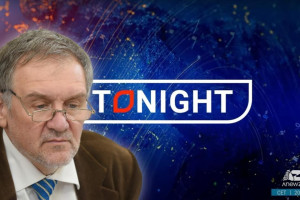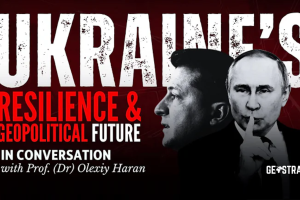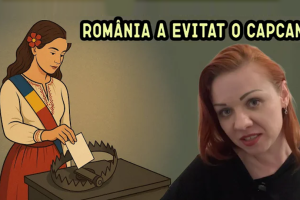Saakashvili's Options Limited After Losing Ukrainian Citizenship
One-time Georgian president, former Ukrainian governor, and current U.S. denizen Mikheil Saakashvili is a man without a country.
But the firebrand Saakashvili, who lost his Georgian passport in late 2015 after he took a government position in Ukraine that required him to be a citizen of that country, has vowed to fight Ukrainian President Petro Poroshenko’s July 26 move to revoke his new status.
The ex-Georgian leader called the move to annul his Ukrainian citizenship "entirely illegal" and “cowardly” and vowed in a video posted on Facebook on July 27 to "fight for my legal right to return to Ukraine.”
It’s not clear what his chances are of having his Ukrainian citizenship restored, however.
 “From a legal point of view, the decision by Poroshenko is justified,” Oleksiy Haran, professor of comparative politics at the National University of Kyiv’s Mohyla Academy, told RFE/RL.
“From a legal point of view, the decision by Poroshenko is justified,” Oleksiy Haran, professor of comparative politics at the National University of Kyiv’s Mohyla Academy, told RFE/RL.
“When Saakashvili submitted the documents for Ukrainian citizenship [in 2015], he didn’t mention in his statement that there was a criminal case against him in Georgia,” Haran said. “According to Ukrainian legislation, he has to [declare it].”
Saakashvili took the governor's job in Odesa in 2015 at the request of Poroshenko, who first met the former Georgian leader as a university student in Kyiv in the 1980s. Poroshenko was counting on Saakashvili's reputation as a reformer who tamped down corruption in Georgia and expected him to do the same in Odesa. But Saakashvili resigned 18 months later, complaining of engrained corruption within Ukraine's government, and now thinks Poroshenko views him as a political threat.
 Yarema Dukh, a spokesman for Ukraine’s presidential office, told the Kyiv Post that Poroshenko signed a decree revoking Saakashvili’s citizenship after being told he gave insufficient information while applying for a Ukrainian passport in 2015.
Yarema Dukh, a spokesman for Ukraine’s presidential office, told the Kyiv Post that Poroshenko signed a decree revoking Saakashvili’s citizenship after being told he gave insufficient information while applying for a Ukrainian passport in 2015.
Haran said that because Saakashvili didn’t admit that he had criminal charges against him, “he violated a basic rule and there was the possibility to deprive him of his Ukrainian citizenship.”
Saakashvili has said the charges against him, which he has said were politically motivated by the new Georgian government, have not been recognized by other countries, including Ukraine.
He said on CNN on July 27 that Poroshenko’s actions are “in violation of the Ukrainian Constitution and in violation of international law.”
There were also reports that taking away the only citizenship a person holds violates international law -- and since Saakashvili only had Ukrainian citizenship the actions by Poroshenko should be null and void.
Return To Ukraine…
In an interview the same day with France24.com, Saakashvili said he would “certainly go back to Ukraine.”
 But Serhiy Leshchenko, a pro-Poroshenko parliament deputy, warned Saakashvili that he would be arrested at the Kyiv airport if he tried to return, adding that he could also face extradition to Georgia, where he is wanted on corruption and abuse-of-power charges.
But Serhiy Leshchenko, a pro-Poroshenko parliament deputy, warned Saakashvili that he would be arrested at the Kyiv airport if he tried to return, adding that he could also face extradition to Georgia, where he is wanted on corruption and abuse-of-power charges.
Saakashvili had pledged to return to Georgia for the October 2016 parliamentary elections but ended up not going after being threatened with arrest by Georgian officials.
…Or U.S. Asylum?
Leshchenko said Poroshenko’s stripping of his former ally’s citizenship was carried out to get Saakashvili to “take asylum in America and forget about Ukrainian politics.”
Saakashvili resided in the United States before taking the position of governor of Ukraine's Odesa region in May 2015. While president of Georgia, he was considered a close U.S. ally and is admired by many for his leading role in Georgia's pro-democracy Rose Revolution in 2003 and his achievements cutting corruption and bureaucracy.
He resigned as Odesa governor in November 2016 after a fallout with Poroshenko and was in New York when the Ukrainian president announced that his citizenship was being revoked.
When asked during the France24.com interview if he would apply for asylum in the United States, however, Saakashvili said "no." He later told CNN he was “not looking for help from anybody right now.”
A Saakashvili assistant, Zoe Reyners, said from New York that the former Georgian president and Ukrainian governor plans to fight the removal of his citizenship and go back to Ukraine to continue his political work.
“He’s not seeking asylum in the U.S. right now,” she said.
Saakashvili added that he would return to Ukraine with “the support of civil society and opposition groups.”
He did find backing for his plight from some quarters in Ukraine.
Former Prime Minister Yulia Tymoshenko’s Batkivshchyna (Fatherland) party said that Poroshenko’s action against Saakashvili was “another step toward dictatorship.”
And Kyiv Mayor Vitali Klitschko wrote on Twitter on July 27 that he does not think the “decision on Saakashvili’s citizenship is a positive thing for the country.”

Boomerang Effect?
Saakashvili was quick to accuse Poroshenko of using the citizenship issue to eliminate possible political opponents.
“He is basically trying to get rid of one of his main opponents,” Saakashvili told CNN.
Although brought by Poroshenko to be Odesa's governor, Saakashvili has been highly critical of the president and the “rule of the oligarchs” that he says is corrupting Ukrainian society and keeping it from progressing.
When he resigned his governorship in November, Saakashvili complained that his anticorruption efforts were being sabotaged, and openly accused Poroshenko of dishonesty. On July 27, Saakashvili said that he was “trying to stop [the corrupt elite] from killing the Ukrainian state” and vowed that “we will bring a new political class to power in Ukraine.”
He added: “They are still scared of me. And the reason they are scared is I do have popular support.”
 People holding their Ukrainian passports at a rally in central Kyiv to support Mikheil Saakashvili, who was stripped of his Ukrainian citizenship.
People holding their Ukrainian passports at a rally in central Kyiv to support Mikheil Saakashvili, who was stripped of his Ukrainian citizenship.
But Haran, from Kyiv University’s Mohyla Academy, said that Saakashvili’s Movement of New Forces party, set up last year after he quit his governor’s post, is currently polling about 1.8 percent in a nationwide survey taken by the Ukrainian-based Democratic Initiative Foundation.
And a rally in central Kyiv on July 27 to protest the removal of Saakashvili’s citizenship drew only a few hundred demonstrators.
Some think the dispute could rejuvenate Saakashvili’s popularity in Ukraine.
“The debate is also [going on now] whether this [action] actually will increase the popularity of Saakashvili or decrease [his] popularity. We don’t know yet,” said Haran.
“There are people who are criticizing the necessity of this move because they think...it could increase the popularity of Saakashvili and create additional problems for the president,” he added.










